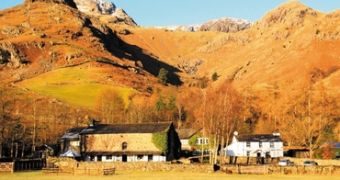Sticklebarn pub near Ambleside in the Lake District, UK is already considered to be the country's most sustainable facility of its kind. The pub makes its own vodka and gin, and serves costumers only locally sourced foods. What's more, whatever profit it makes is used to safeguard landscapes.
Still, the National Trust, i.e. the organization that owns and runs the pub, feels that there is room for improvement.
Hence, it has recently asked for permission to build a hydropower plant that would provide the Sticklebarn pub with whatever green energy it would need to keep up and running.
According to Click Green, the National Trust has been given permission to move forward with its plans to equip the pub with its own hydropower plant, and is now getting ready to begin work on this green energy project.
Information shared with the public says that Sticklebarn pub's hydropower plant will harvest energy from the flow of a stream located in its proximity.
More precisely, the pub is to be fitted with a generator that will be powered by the stream's 200 liters per second flow.
When up and running at full capacity, the plant will have an annual energy generating capacity of 350,000kW per year.
Specialists estimate that, all things considered, this output would suffice to meet the power demands of roughly 80 average households.
Costs for this project are expected to amount to £650,000 (about €775,685 / $1,063,930), the same source tells us.
Interestingly enough, the National Trust will also invest in another hydroelectric scheme at Craflwyn near Beddgelert, Snowdonia, and in a marine source heat pump at Plas Newydd, Anglesey.
Commenting on these green initiatives, National Trust Rural Enterprises Director Patrick Begg said that, “We’ve been working closely with our specialist conservation advisers to ensure these developments are at the right scale and location and work totally in tune with their historic and natural setting – and it seems the planning officers agree.”
“We care deeply about the beautiful places we look after and want them to stay that way forever,” he went on to argue.

 14 DAY TRIAL //
14 DAY TRIAL //